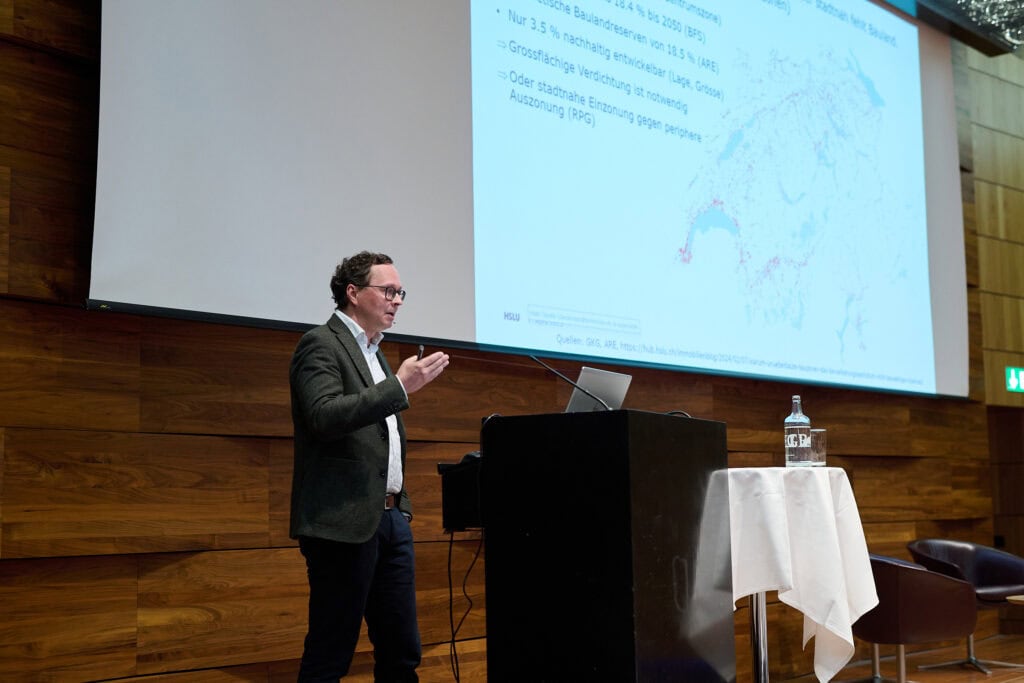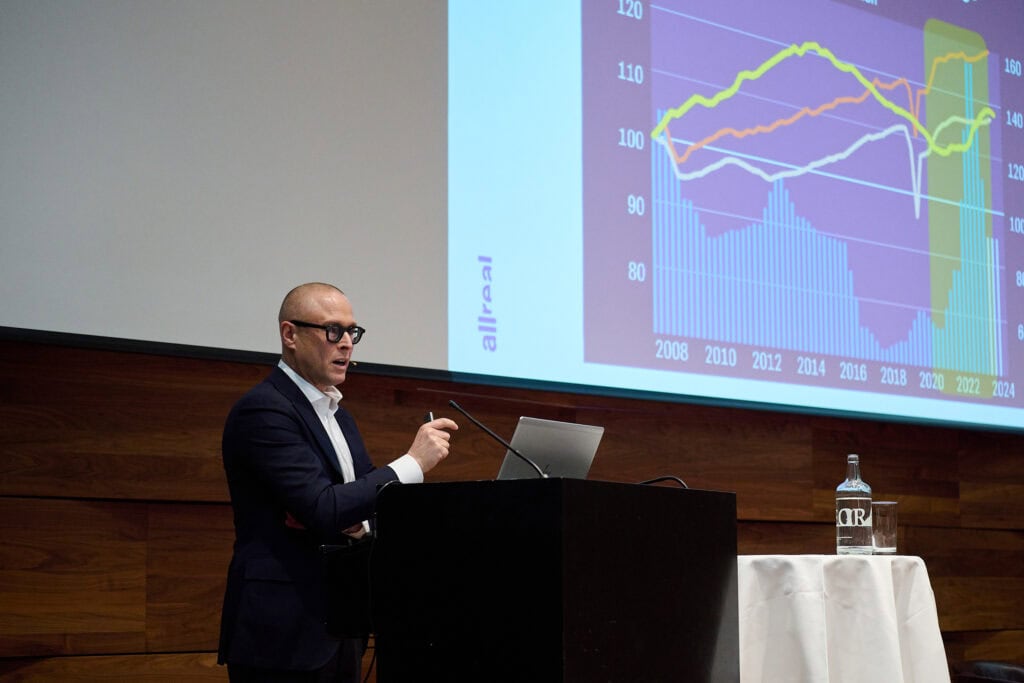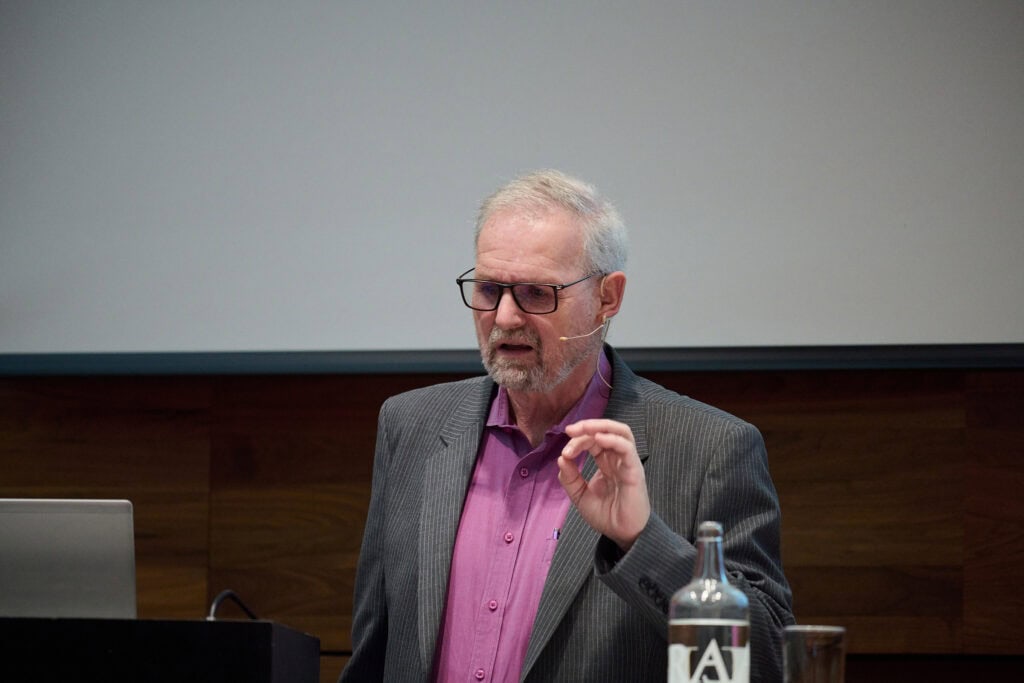Review of the 103rd Swiss Real Estate Talk
There is a lot of controversial talk about high residential rents. Rarely, however, do the core of the differences become clearly visible as they did these days on the podium of the "Swiss Real Estate Talks". The participants struggled to reach an understanding with commitment and sincerity.

The 103rd Real Estate Discussion entitled "Expensive rents - hardened fronts" focused on the housing shortage in Switzerland's major cities - a much-discussed topic. However, the situation in which the real estate industry finds itself was also discussed: the private sector is seen as a profit-hungry villain that is unable to provide the urgently needed apartments. Moderator Markus Schmidinger from Lucerne University of Applied Sciences and Arts outlined the unfortunate situation and asked: Is the real estate industry the problem, or does the solution perhaps lie in fundamental alternatives - such as building cooperatives - or even in a change of system?
It proved to be a stroke of luck for the real estate talk that Peter Schmid was there. With this veteran of the cooperative building scene, a representative of the other camp took part in the discussion with the real estate industry - and he did so in an extremely constructive manner. Not that the event surprisingly opened up a bridge across all divides. But something was achieved that is also urgently needed in a debate that is not always clear-cut: getting to the heart of the disagreement between the camps.
Cost driver: land prices
The journey there began with a presentation by HSLU professor Christian Kraft. In just a few minutes, he managed to organize the large and multifaceted topic and analyze the options. Land prices emerged as the main cost driver. Kraft did the math: In Zurich, they have risen so exorbitantly that the cost rents in the project calculation are no longer very significantly below the market rents. Another core thesis of Kraft's presentation: The solution to the housing shortage does not lie in tenancy law, but in large-scale densification and better utilization of the building land - in Switzerland, 85% of all residential buildings so far have only two upper floors or even less.

"Big trenches"
After the scientist, Stefan Dambacher, the representative of a developer, had his say. The Head of Development at Allreal used a specific project to show that those who are supposed to build apartments are sometimes affected by the sharp rise in land prices. A few years ago, Allreal had to put a total of 31 million or 17,000 francs per square meter on the table for a plot of land in Zurich - and thus made the owners rich, who had achieved an increase in value of 25 million in 20 years through four upzonings. In view of the high land prices, the project developers themselves have an interest in maximum utilization, but this is often not sought. Why does the potential land remain unused? Because, according to Dambacher, developers avoid a lengthy dialog with politicians and shun design plans. He lamented the "huge rifts" and that communication with local councillors is more difficult than it was years ago. There is a general lack of understanding of the basics on the political side - how this market works, how a return is generated and how the land yields interest.

Dissent on the issue of added value
Many of the points raised by Dambacher came up again in Peter Schmid's presentation. However, viewed through his cooperative glasses, they appeared in a completely different light. The topic of land prices, for example, also played a central role in Schmid's survey. But while Dambacher emphasized that land prices were merely a function of high demand and far too low supply, Schmid saw the core of the problem in the process of creating added land value itself - and its absorption. Schmid questioned whether the additional land value created by upzoning, for example, is in the nature of things. He made it sound as if it was merely a convention, a matter of accounting standards and valuation methods - see DCF - which could be disposed of with the stroke of a pen.

A question of ideology?
Schmid did not seem entirely averse to posing the big systemic question and said in the subsequent panel discussion that it was ultimately the system that had brought us to this situation on the housing market. Schmid found his main opponent in Dambacher, who replied that it had been empirically proven that immigration was responsible for the high prices. The cooperative model, which sometimes makes low rents possible thanks to land book values that have remained unchanged for decades, is "an economic island", and he asserted: "There is added value". The return on capital appreciation is not abolished in the cooperative model, but redistributed, as Christian Kraft later added. The beneficiary here is the tenant, who can live in a desirable location at a reasonable price. And not to forget: In this model, too, there is an owner, the cooperative member, and it could be said that he is deprived of the value gain.
Industry must take care of its image
The big elephant in the room - the question of system change, the abolition of private ownership of land - was also discussed at the end. One of the smartest interventions of the evening came from Christian Kraft, who argued that even fundamental demands such as the communitization of land or the abolition of current valuation standards were legitimate, but there was no guarantee that they would lead to the desired goal. What is certain, however, is "a long valley of tears that we will all have to go through" - similar to Trump's tariffs, which, as we are currently seeing, will initially shake up the market. Solutions that claim to be pragmatic rather than ideological would have to be based on the existing system. "And we live in Switzerland, where there are property rights."
The discussion was not only passionate, but also honest, and the impression that there was no possibility of understanding across the camps did not arise. Even in the private sector, not every profit is considered sacrosanct - Dambacher, for example, suggested that ways should be found to skim off a justifiable portion of the speculative profits realized on land sales and benefit the tenants.
Schmid, on the other hand, not only showed understanding for the concerns of the private sector in many areas, but even shared them. "We cooperatives are plagued by the same concerns," he said in view of the many obstacles complained about by profit-oriented developers - objections, lengthy processes, increasing regulatory density through ESG and now also the Isos townscape protection. He sees a common denominator, said Schmid. This was also expressed in the fact that he sees the consequences of the Zurich housing protection initiatives as negative in the long term, which means he does not speak for the cooperative camp as a whole.
And self-critical comments were heard from the real estate industry: The representation of interests had been too lobby-heavy recently and not always communicated intelligently. In view of the negative mood in society, moderator Markus Schmidinger ended the evening with an appeal: It was time for the industry to get involved again and work on its image.

























